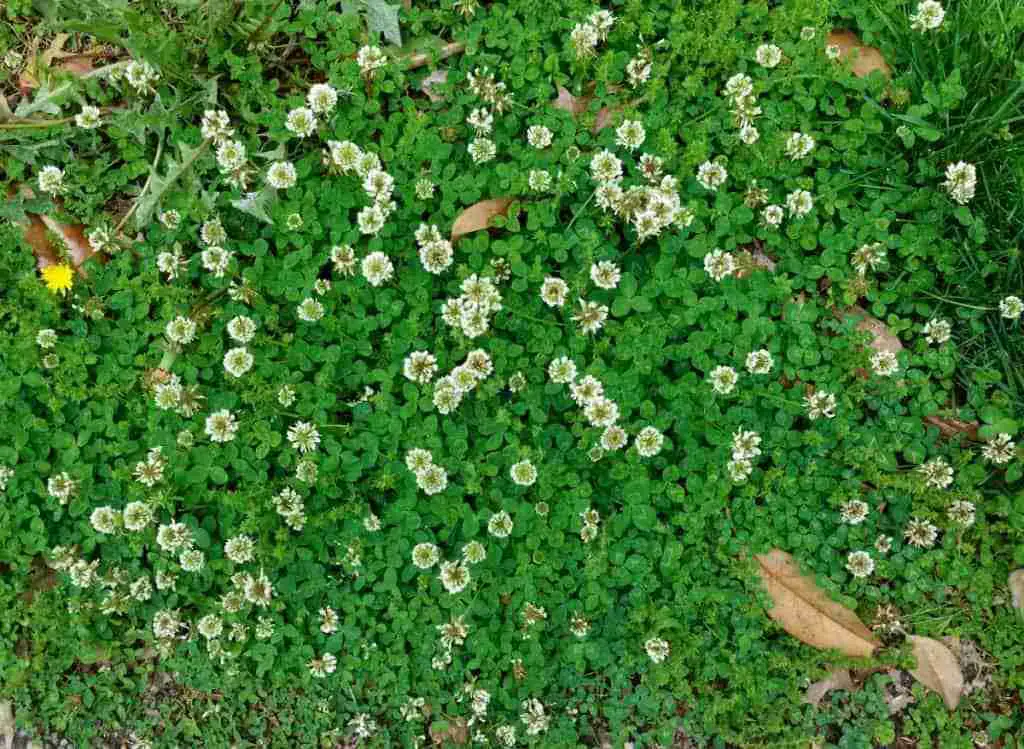
Although it is pretty stubborn, clover (aka Trifolium repens) is beneficial. It brings nitrogen into the soil and promotes grass growth when it decomposes. Still, some people don’t appreciate all those small white clover flowers disrupting their field of green, so how to get rid of clover naturally and faster?
You can get rid of clover naturally using several methods. Here is how you can naturally get rid of clover:
- Regularly Fertilize Your Lawn
- Remove Clover Manually
- Deprive Clover of Oxygen and Sunlight
- Kill Clover With Vinegar
- Kill Clover With Corn Gluten
- Use an Organic Herbicide
- Mow Your Grass Higher Than 3 Inches
- Water Your Lawn Correctly
- Seed Those Empty Spots
Clover is known to attract rabbit pests, which love to snack on clover and nearby garden plants. Unfortunately, mowing it over is only a momentary fix, as clover always grows back and fast.
So if you are looking for natural ways to get rid of clover, you are in luck. Read on for simple and easy DIY solutions for how to get rid of clover for good.
See also: How To Get Rid Of Worms In Potted Plants: A Quick Guide
What is Clover?
Clover is a common name used for the genus Trifolium, a group of about 250 plants that fall in the legume and pea family. In the US, perennial white clover (Trifolium repens) is the most common type of clover, growing everywhere thanks to its nitrogen production.
Worldwide, white clover is recognized as an essential component of pastures due to its ability to fix nitrogen and provide quality feed for enhanced animal production.
Clover also has many identities depending on where you live. For example, it’s considered good luck to find a four-leaf clover. Also, it is a weed, a desirable part of a home lawn, and a feed crop to some people.
And to others, the clover is a source of fascination, religious symbolism, and a hallmark symbol of St. Patrick’s Day.

How to Get Rid of Clover Without destroying The Lawn
Your goal should be to get rid of clover without damaging your lawn. Here are 9 ways to get rid of clover without destroying the yard.
1- Regularly Fertilize Your Lawn
Most fertilizers include nitrogen which helps fight clover growth. So if your lawn is well-fertilized, it will decrease the likelihood of clover overtaking it.
Whenever possible, try to buy a nitrogen-rich fertilizer because the absence of nitrogen in the soil also allows the clover to grow. Seldom organic fertilizers will work if you have a small clover; however, if the clover is still challenging, stay with standard fertilizer that is not slow-release.
Slow-release, nitrogen-rich organic fertilizer can help prevent clover growth in the first place and can lead to a healthier and better lawn in the long run. Common organic fertilizers include cow manure. However, it is essential to read the directions carefully to avoid undesirable effects.
Always remember that a well-fertilized lawn will stay free of weeds, and proper nitrogen levels will give you an extra edge against clover. A lack of nitrogen allows this weed to thrive because clover can produce its nitrogen.
Organic fertilizers might help if you have a small amount of clover, but if your lawn is becoming overrun, choose a standard fertilizer that is not slow-release. You can also try a nitrogen-rich weed-and-feed formula.
2- Remove Clover Manually
Another natural way to get rid of clover in your lawn is to manually remove clumps from your yard. When you see clover clumps on your property, the best thing to do is pull them up completely, including the roots.
This method is one of the best ways to remove clover from your lawn naturally, and even though it may be time-consuming, your efforts will pay off since you are pulling the roots out; therefore, the clover shouldn’t grow back.
Also, try not to give clover a chance to spread. Instead, get rid of small clusters as soon as you notice them by gently loosening the soil around the base with a shovel or your fingers, then plucking the clover up. Make sure you get all of the roots.
Tips on Manually Removing in Your Garden:
- Loosen the soil around the roots
- Grab the bottom of the plant, and pull gently to remove the whole clover plant.
- Repeat this process until you extract all the clovers from your lawn.
- You can also check out this video on controlling clover in your yard.
3- Deprive Clover Of Oxygen and Sunlight
A different way to remove clover from your lawn is to deprive it of oxygen and sunlight and prevent it from growing. This technique is helpful for removing larger patches of clover and getting rid of other types of weeds, like crabgrass that may be on your lawn.
Use this technique only on large clover patches; otherwise, you will affect the surrounding grass.
First, put a plastic sheet or garbage bag over the clover patch, then secure the corners so they won’t blow away. This technique should kill the weeds in a few weeks; however, don’t use this method long-term, or the surrounding grass could be damaged.
See also: How To Keep Ants Off Strawberry Plants: Here’s How To Do It
4- Killing Clover With Vinegar
Many gardeners use natural weed control remedies to remove clover. It is homemade and easy: mix vinegar with a small amount of dish soap, put the mixture in a spray bottle, and spot clover clumps. Don’t forget to take care to avoid surrounding plants.
How to Create your Homemade Weed Control Remedies? You create a homemade non-toxic clover-killing blend using vinegar and water. Combine the vinegar, dish soap, and water in a spray bottle. Shake the mixture and spray over any patches of clover. The soap will make the vinegar stick to the leaves, and the vinegar will make the clover dry out.
You will need:
- 1 cup vinegar
- 1 drop of dish soap
- 1 cup water
- Spray bottle
Try to be patient because it may take several weeks of spraying for the solution to dry out the clover completely. Also, this homemade solution might damage the grass, so use it carefully.
5- Kill Clover With Corn Gluten
Corn gluten meal can suppress clover growth without damaging any surrounding plants. It releases organic dipeptides into the soil, drying out clover seeds and making them more difficult to sprout.
Because of how clover grows, it is essential to apply corn gluten at the right time. Corn gluten does not prevent seeds from germinating, but it stops them from forming roots.
Tips: Spread about 20 pounds of corn gluten meal per 1,000 square feet of lawn, water well, and let it dry naturally.
And remember that applying the corn gluten when the conditions are too wet will be less effective. Also, the product only remains effective five to six weeks after application, so make sure you apply.
Here is a video on how to use cornmeal in your lawn and garden.
6- Use an Organic Herbicide
You can use A.D.I.O.S., a selective, organic herbicide that helps eliminate clovers without destroying the lawn. Spray it on clover, and it will weaken and die.
7- Mow Your Grass Higher Than 3 Inches
Some people may think moving closer to the ground will eliminate the clover; however, it is only temporary. Clover has a shallow root system and grows close to the soil. Therefore, if you mow your grass higher, it will block out the light, prevent it from reaching the clover, and hopefully cause the clover to die.
So, leaving your lawn a little longer can help you get rid of clover in your yard because clover grows low to the ground and has a shallow root system.
So if you increase your mower deck and keep grass three or more inches high, your taller grass can efficiently block sunlight exposure to the clover.
This method helps prevent clover from growing and spreading throughout your entire lawn.
8- Water Your Lawn Correctly
While the proper amount of watering will depend on your type of soil and grass, gardening pros advise monitoring your lawn rather than taking a set-it-and-forget-it approach to a watering arrangement.
Instead, aim to water your lawn deeply once or twice a week as a rule of thumb, and always remember to water only when the lawn starts to look dry or growth seems stalled.
Keeping the ideal moisture level is one secret to removing clover from your lawn. Too-wet grass is the perfect habitat for weed seed germination, but thirsty grass is typically stressed out, attracting weeds.
9- Seed Those Empty Spots
After you successfully get rid of clover patches, you might notice that open areas on your lawn become even less attractive than the weeds.
The best solution is to lay down grass seed right away and cover it with a thin layer of mulch.
Then, water the grass seed frequently to encourage new growth and follow proper lawn care for mowing and fertilizing to keep clover from coming back.
See also: How To Remove Aphids From Kale: A Quick Guide
Benefits of Having Clover In Your Lawn
Some people argue that clover is beneficial to your lawn. Indeed it helps to have clover in your yard. Here are a few reasons some people choose to keep clover in their lawns:
1- Clover Fertilizes Your Lawn
With the right amount of clovers, you will notice that your grass is greener and thicker. Some people worry that clover will overtake their lawns, but it will not happen. Instead, clover helps your lawn thrive.
Without clover, your grass could dry out and turn brown from the summer heat, but it could stay green and lush with the clover.
2- Clover Is a Natural Fertilizer
Clover’s symbiotic relationship with beneficial bacteria enables it to absorb nitrogen from the atmosphere.
So, ultimately, it can make your lawn greener and lusher. First, however, this will keep it growing and out-competing your grass.
3- Clover is a Nitrogen-Fixing Plant
Clover brings nutrients to your soil and does not require fertilization.
When combined with other grasses, clover can decrease or eliminate the need for frequent fertilizing.
4- No More Burn Marks
Clover will not usually turn yellow as quickly from pet urine compared to regular lawn.
5- Clover Requires Less Water
Clover is dehydration tolerant. It grows despite the lack of water after it settles compared with traditional lawn grasses, which usually require frequent watering all season long.
6- Wildlife Love Clover
Wildlife, including deer and bees, love clover and may come to your lawn searching for a tasty snack.
Depending, it might not be a positive thing for everyone, but you are helping to protect and preserve nature.
7- Clover is Affordable
Another benefit of Clover lawns is that it is affordable and easy to grow.
See also: How To Get Rid Of Golden Rain Tree Bugs: A Complete Guide
What Kills Clover But Not Plants?
Manual removal of clover is one of the best ways to kill clover but not plants because it allows you to remove it from your garden without damaging the grass. This technique may take time if you have a large backyard, but it is effective.
The clover in the lawn shows an insufficient amount of nitrogen in the soil. And the best way to kill clover without damaging other plants is to create an environment that discourages clover growth while benefiting the plants.
Why Do You Have So Much Clover in Your Lawn?
The reasons below explain why you have so much clover in your lawn.
1- Wrong Soil pH
Most clovers can grow at almost any pH. However, the ideal soil pH—how alkaline or acidic the soil is—for most lawns is between 6.0 and 7.0. If your lawn’s ground is too acidic, it will be harder for grass to grow and much easier for clover.
If you think pH might be the issue with your soil, check your soil’s PH. Once you know your soil’s PH, you can apply the best solution that fits your situation.
Generally, you can add lime and sulfur to raise the pH, and by adding compost, you can naturally correct your pH.
2- Insufficient Water
Without sufficient water, your grass becomes stressed, leaving more room for weeds like clover to grow.
To prevent this:
- Try to water your lawn slowly and deeply.
- Water 2 to 3 times a week during dry periods.
- Try watering your lawn in the mornings because it can help prevent many lawn diseases.
See also: How to Lower Manganese Levels In Soil
3- Insufficient Soil Nutrient Levels
Clover thrives in soil with insufficient nutrient levels, particularly nitrogen. Grass needs nitrogen to grow well, but clover can get nitrogen from the air and typically make its fertilizer.
Using organic lawn fertilizer can help boost these nitrogen levels and promote healthy grass growth while preventing clover growth.
4- Compacted Soil
Compacted soil can make growing plants in a flower or vegetable garden challenging. However, clover grows better in compacted soil than grass because clover has longer roots, allowing it to access water better than grass can.
Here is a helpful article on what to do about compacted soil by Michigan State University.
See also: How To Deal With Too Much Iron In Your Garden’s Soil: A Guide
Wrapping Up
With these 9 solid ways to get rid of clover, you should be able to prevent having clover take over your lawn or garden. However, understanding the beneficial aspects of clover may help you see it as more friend than an enemy.
The key is to find the right balance between getting rid of clover and encouraging clover growth to reap its benefits.


